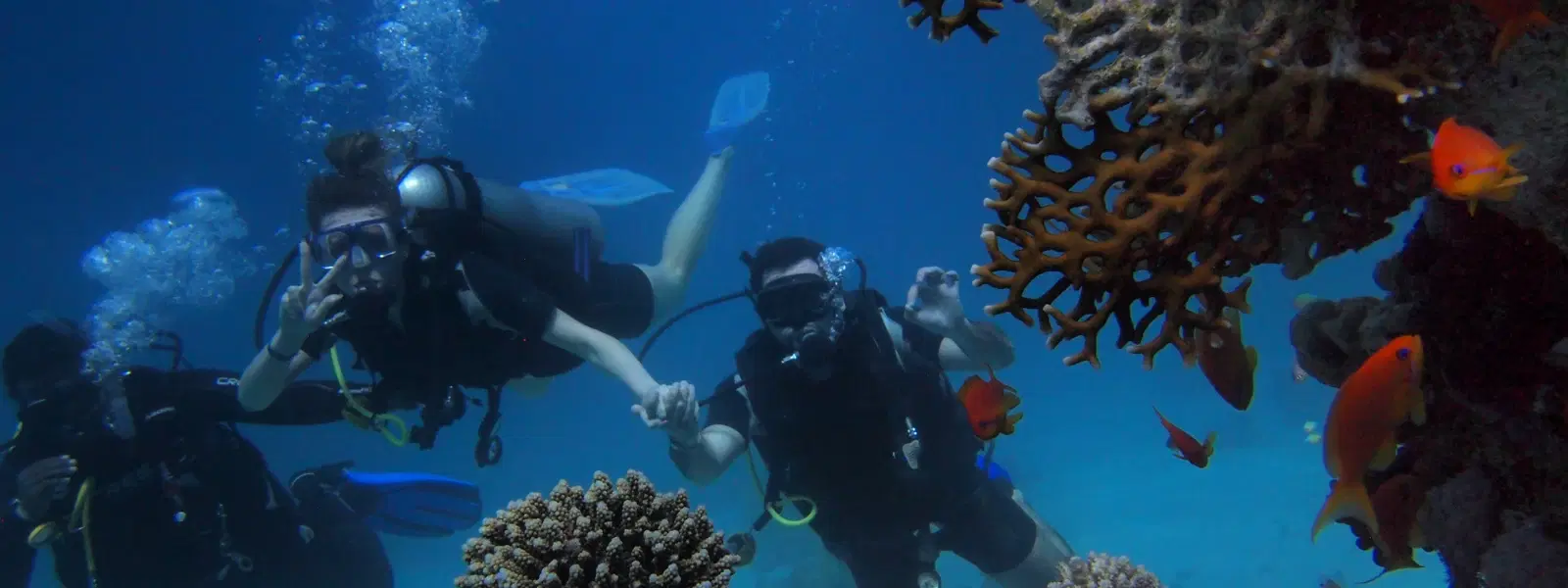
Hotels
•04 min read

Imagine gliding above a burst of colors beneath the deep blue. The water shimmers and reveals Thailand's stunning coral reefs. This underwater world is a treasure trove of marine life and vivid landscapes. Many travelers dream of exploring these vibrant seascapes. In this post, we answer the most common questions about snorkeling in Thailand. Whether you are curious about the best snorkeling spots or need advice on equipment, you will find helpful insights here.
Thailand is known globally for its coral biodiversity. The tropical waters hold a magical charm that attracts snorkelers from every corner of the world. The coral reefs here are teeming with colorful fish, playful sea turtles, and even shy reef sharks. Each reef is a living canvas displaying vibrant hues of marine life. This is a paradise for anyone eager to explore tropical snorkeling in Thailand.
Snorkeling is an excellent way to dip your toe into underwater adventures. Unlike scuba diving, it requires minimal equipment and training. People who are new to underwater exploration find snorkeling to be more accessible and cost-effective. It offers a gentle introduction to the rich marine life in Thailand. For many, it is the stepping stone to more adventurous underwater activities.
Many islands in Thailand provide unforgettable snorkeling experiences. The Similan Islands and Surin Islands are famed for their clear, inviting waters. Koh Tao and Phi Phi Islands stand out for their unique underwater landscapes. Each destination offers lively reefs and a diverse array of marine life, making them some of the best snorkeling spots in Thailand. These places are a must-see on any snorkeling tour in Thailand.
Beyond the well-known spots, Thailand hides many less crowded treasures. Ao Mae Yai, Bamboo Island, and Japanese Garden are such hidden gems. These locations offer peaceful environments and equally stunning underwater scenes. Reaching these secret spots can be an adventure in itself. Early morning visits or off-peak tours often provide the quietest conditions, allowing you to enjoy Thailand underwater adventures at their best.

The best period to enjoy snorkeling in Thailand is typically from November to April. During these months, the weather remains dry, and seas are calm. Water clarity improves significantly in this season, revealing the true beauty of Thailand coral reefs. The conditions allow you to fully appreciate the marine life in Thailand while avoiding harsh weather. Note that water conditions may vary from one region to another, so planning ahead is essential.
Selecting a trustworthy snorkeling tour makes all the difference. Many options include day trips or more immersive liveaboard experiences. When choosing a tour, look for experienced guides and proper safety measures. Quality equipment and well-maintained boats also ensure a safe journey. With a thoughtful choice, you can enjoy a hassle-free and enriching experience in snorkeling tours Thailand offer.
Before you dive in, it's important to sort out your gear. Essential equipment includes a mask, snorkel, and fins. Some locations offer quality snorkeling equipment for rent. Always choose gear that fits well and is comfortable. Using eco-friendly products like reef-safe sunscreen helps protect the delicate reefs. Practicing sustainable snorkeling is a responsibility every adventurer in Thailand should embrace. Using snorkeling equipment Thailand provides responsibly helps preserve these underwater wonders for future generations.
Safety comes first for any snorkeling adventure. Check water conditions before you enter the water. Avoid touching or stepping on any corals, as these delicate structures take years to form. Stick to designated snorkeling areas. Respect the marine life and follow local guidelines. This ensures that all visitors can enjoy Thailand's underwater beauty without harm.
Pro Tip: Snorkel Like a Pro While Protecting the Reefs
Always use reef-safe sunscreen and avoid stepping on or touching corals. This simple act helps preserve Thailand’s delicate underwater ecosystems for future generations.
While snorkeling, you will encounter a dazzling array of marine species. Brightly colored clownfish and parrotfish are common sights. Sea turtles gracefully move through the water, and other unique species complete the underwater tapestry. On rare occasions, you may even spot majestic whale sharks or manta rays near the reefs. The diversity of marine life in Thailand makes every snorkeling trip an exciting exploration.

Thailand offers more than just daytime snorkeling. Night snorkeling reveals a different side of the underwater world, where the reefs glow softly under the moonlight. Some tours explore areas near shipwrecks and hidden caves. These unique experiences are perfect for those seeking a bit of thrill along with family-friendly adventures. The variety ensures that there is a snorkeling experience to suit every taste.
Yes, Thailand is renowned for its excellent snorkeling opportunities. Its crystal-clear waters and vibrant coral reefs create an outstanding underwater experience.
The best time is typically from November to April when the seas are calm and water clarity is at its peak.
Phuket offers superb snorkeling spots. Locations like Coral Island, Racha Island, and Phi Phi Islands showcase Thailand coral reefs and diverse marine life.
Snorkeling tours generally range from $20 to $50 for a half-day excursion. This fee often includes equipment rental.
Beginners can enjoy calm waters at family-friendly spots such as Koh Tao, Bamboo Island, and Ao Mae Yai. These destinations are ideal for new snorkelers.
Thailand’s coral reefs and snorkeling adventures create a magical underwater world. This guide has revealed why snorkeling in Thailand is a must-do experience, where you can find the best snorkeling spots and plan a thrilling adventure. From the tropical waters bursting with exotic marine life to the hidden snorkeling gems waiting to be explored, each moment underwater becomes unforgettable. Equipped with these tips and insights, you can safely plunge into the wonders of Thailand's underwater life. Let your journey be filled with enthusiasm and respect for nature, assuring a legacy of sustainable exploration for future adventurers.